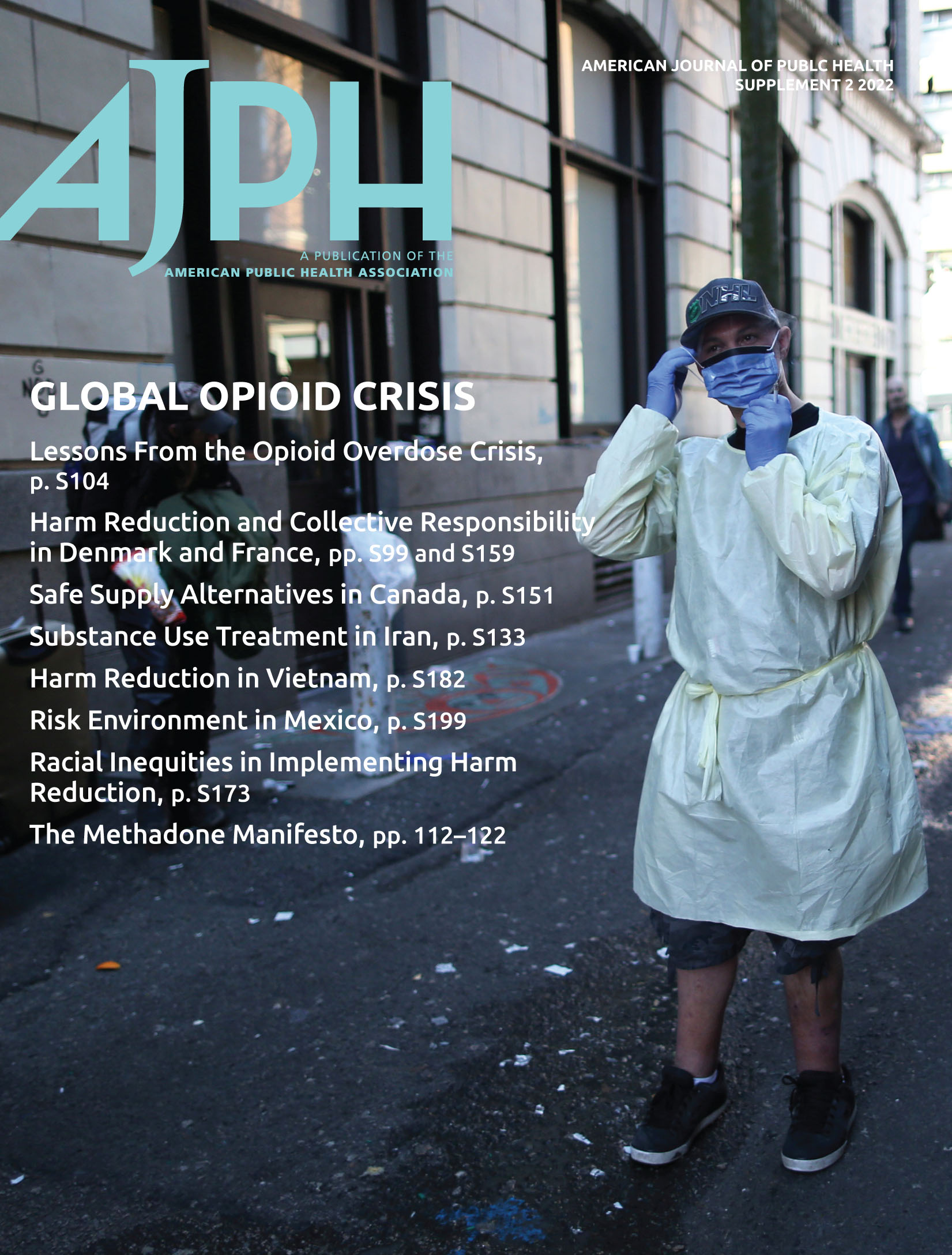News & Updates — Grantee Spotlight
Grantee Spotlight: Looking Abroad for Models of Treating Opioid Use Disorder, Preventing Harm, and Promoting Social Justice
March 29, 2022 Helena Hansen, M.D., Ph.D., is chair of the Research Theme in Health Equity and Translational Social Science at UCLA’s David Geffen School of Medicine, where she fosters social science research within academic medicine. With funding from FORE, Hansen and two colleagues — Marie Jauffret-Roustide, Ph.D., a senior researcher at the French Institute of Health and Medical Research in Paris, and Ryan McNeil, Ph.D., assistant professor and director of harm reduction research at Yale School of Medicine’s Program in Addiction Medicine — lead the Substance Use X COVID-19 International Data Collaborative. Formed in 2020, the collaborative brings together social scientists, community researchers, and public health clinicians from around the world to study the impacts of grassroots innovations and social policies aimed at expanding access to treatment for opioid use disorder (OUD) during the pandemic. A special supplement of the American Journal of Public Health, published in March 2022, highlights some of their findings. FORE spoke to Hansen about the collaborative’s work.
Helena Hansen, M.D., Ph.D., is chair of the Research Theme in Health Equity and Translational Social Science at UCLA’s David Geffen School of Medicine, where she fosters social science research within academic medicine. With funding from FORE, Hansen and two colleagues — Marie Jauffret-Roustide, Ph.D., a senior researcher at the French Institute of Health and Medical Research in Paris, and Ryan McNeil, Ph.D., assistant professor and director of harm reduction research at Yale School of Medicine’s Program in Addiction Medicine — lead the Substance Use X COVID-19 International Data Collaborative. Formed in 2020, the collaborative brings together social scientists, community researchers, and public health clinicians from around the world to study the impacts of grassroots innovations and social policies aimed at expanding access to treatment for opioid use disorder (OUD) during the pandemic. A special supplement of the American Journal of Public Health, published in March 2022, highlights some of their findings. FORE spoke to Hansen about the collaborative’s work.
How did the collaborative come about and why did you take an international approach?
Hansen: It arose spontaneously in the early days of the pandemic as those of us doing field work in this area began to see the devastating impact of disrupted access to treatment and social supports. We were all observing the acceleration of overdoses and could see how already dire problems, such as tenuous access to housing and the contamination of the drug supply with fentanyl and other synthetic opioids, were getting worse. In the beginning, there were around 30 of us from the U.S. and other countries — including France, Iran, Uganda, the U.K., and Vietnam — who came together out of a sense of alarm. Comparing drug policies and services for people who use drugs across national contexts under COVID containment helped us identify and highlight best practices. We also needed a way to quickly collect data and present the findings to policymakers and the public so that the data could be used in real time to maximize policy responses.
How did you organize the effort?
Hansen: At first, we looked at short-term solutions to the problems of people who use drugs under COVID containment, which we publicized via webinars starting just one month after COVID emerged. We heard from harm reduction organizations that had figured out how to make their own personal protective equipment and distribute it quickly and from groups that had rapidly increased access to safe housing. We also knew we wanted to create a research network that could pool data from multiple sites to monitor the effects of the pandemic on overdose rates and the drug supply, as well as the effects of different public health interventions and harm reduction approaches. We leveraged data from emergency medical services records to show for the first time that overdose deaths in the U.S., which were already sky high, increased 42.1 percent in 2020 compared with 2018 and 2019, when they remained relatively constant. Another finding was that overdose deaths for Black Americans exceeded those of white Americans for the first time in 20 years.
The special supplement in the American Journal of Public Health calls attention to promising practices in other countries and the perils of not addressing the social drivers of drug use — including adverse childhood experiences and poverty. What do you hope the supplement accomplishes?
Hansen: Among other things, I hope it highlights the limitations of taking a strictly biomedical approach to treatment and recovery and the importance of social determinants and harm reduction approaches in the continuum of care. The supplement shows how some countries managed to avoid overdose deaths during the pandemic through comprehensive services. France, for example, has community-based centers where people with substance use disorders can access medications for opioid use disorders (MOUD), comprehensive medical services, and assistance with housing and employment. The centers also offer harm reduction services, including safe consumption sites, and support from peers in recovery. Providers were able to quickly implement mobile deliveries of MOUD because they had government support and an orientation toward harm reduction. As we looked around the world, this seemed to be a theme. Countries that had low barriers to treatment and harm reduction services before the pandemic were more responsive to changing conditions and did not see the same increase in overdoses that the U.S. did.
Were there other countries that stood out?
Hansen: Iran. It always catches us by surprise because we grew up with the image of Iran as a politically conservative place. It turns out Iran has been a leader in treatment and harm reduction. The government supports opioid maintenance programs and syringe exchanges and has centers that address the socioeconomic elements of treatment and recovery. They have specialized centers for women, including those involved in sex work, for instance. They have lowered the cost of opioid maintenance treatment to well below the cost of street supplies by keeping clinical service charges minimal and repurposing opium that is seized from illegal smuggling for prescribed medical maintenance as opium tincture.
One of the things that’s distinctive about the collaborative is that it takes a cross-disciplinary approach and purposefully engages people who use drugs in the research process. What’s the benefit of this?
Hansen: Contrary to the way many clinical researchers are taught — that scientific objectivity requires not involving people with a personal stake in research — we’ve found the opposite is true. If you want to have really high-quality data and to ask the questions that are most relevant to current realities, you should be involving people directly affected at each step. The supplement includes a Methadone Manifesto from the Urban Survivors Union’s Methadone Advocacy and Reform Working Group. Written by people who themselves take methadone, it highlights research gaps as well as clinical practices and policies at opioid treatment programs that are not aligned with patient needs. They point out that goal setting is often driven by staff, not patients, and that many people face barriers getting take-home doses of methadone despite the loosening of restrictions during the pandemic. The manifesto was featured prominently at a recent meeting on methadone regulation, co-sponsored by the National Academy of Medicine and the Office of National Drug Control Policy. That’s a real shift. It shows how we can unite the policy and research communities to gain traction on issues that don’t get the attention they deserve.
How about best practices in the U.S.? What are you finding?
Hansen: The supplement largely focuses on lessons from treatment and harm reduction practices in other countries, but one of the articles focused on the U.S. looked at the benefits of having diverse leadership in harm reduction and addiction treatment organizations and efforts. Based on interviews with four Black and Latino leaders, it shows what a difference such leadership makes in fostering trust with communities that have been marginalized. There’s such an emphasis in U.S. drug policy on criminalizing drug use among people of color and treating it as a medical issue for white Americans. Having leaders who reflect the communities they serve and can advocate for more just approaches can help undo some of the harm.
Contributors to the March 2022 American Journal of Public Health special supplement, “Crisis and Change: Overdose and Health Justice During and After COVID-19,” will present their findings at a webinar beginning at 9:00 am ET on Wednesday, March 30, held in partnership with FORE, the Drug Policy Alliance, and the International Society of Addiction Medicine. Registration is free. Among the speakers is Tetiana Kiriazova, Ph.D., M.Sc., the director of the Ukrainian Institute on Public Health Policy, who will describe the impact of the crisis in Ukraine on people who use drugs.
The event will also showcase best practices and policies for promoting access to treatment for opioid use disorder and harm reduction services during the pandemic and beyond, as well as other lessons drawn from the FORE-funded Substance Use X COVID-19 International Data Collaborative.